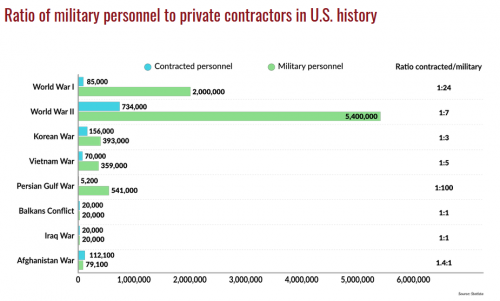Private equity and the rise of mercenary armies
In 2021 55% of all Pentagon spending went to private sector military contractors. That's $407 Billion, more than the federal government spent in stimulus checks to working people.
Private equity has increasingly led this trend, which causes two alarming problems. First of all, private equity doesn't have the same financial disclosure requirements as publicly traded firms, and once they buy defense contractors their finances can "go black" completely.
In 2021 alone, private equity funds invested $15 billion in nearly 140 defense-related deals. Firms have acquired some of the world’s largest defense contractors, including Amentum, which claims that it is the second leading provider of services to the U.S. government. (Just last month, Amentum won a $4.7 billion contract with the Air Force.)Since private funds are not required to share information about their portfolio companies, contractors often “disappear into a black box” after an acquisition, according to SIPRI researchers Lorenzo Scarazzato and Madison Lipson...
In 2019, private equity firms carried out 42 percent of total defense contractor takeovers.
The second problem is one that has existed since the beginning of time - the lack of accountability from mercenaries. For instance, DynCorp became infamous in early in the Afghan occupation when it was discovered that it's private army was involved in enslaving and trafficking young girls. Then a whistleblower exposed that DynCorp did the same thing in Bosnia a few years earlier. Instead of making DynCorp toxic, they were sold a decade later for billions of dollars to a private equity firm.
At the time, DynCorp’s annual sales were about $3.5 billion and its two largest customers were the U.S. Defense and State Departments. A company spokesman told Defense Daily that the Defense and State Departments remain DynCorp’s two largest customers followed by other federal, state and local government agencies.
DynCorp has since merged with Jacobs Defense Unit and is now a $13 Billion company.
Here's another example. Remember WashPost reporter Jamal Khashoggi, who went into a Saudi embassy and then got cut into small pieces? The facts that you may not have heard about was that the four security members that did it got training at Tier 1 Group, a large private military contractor based in the U.S.
This was no renegade operation, however. Tier 1 Group, whose training had approval from the US State Department, is part of a burgeoning global industry. Corporate mercenaries – or, more properly, private security and military companies – are increasingly taking over functions that were once carried out by states, with grave implications for human rights and democracy worldwide. It’s big business, too: Cerberus Capital Management, the private equity fund that owns Tier 1 Group, also owns a string of arms manufacturers. In April 2010, Cerberus merged with DynCorp International, one of the world’s largest corporate mercenary companies.

I shouldn't have to tell you that the only things mercenaries are loyal to is money, and how this is in direct conflict with human rights, but in case you didn't get the memo.
In Cape Town, South Africa, corporate mercenaries such as Professional Protection Alternatives take on the role of police forces, patrolling wealthy neighbourhoods and carrying out operations to evict people from public spaces.The privatisation of prisons and detention centres has sparked the greatest opposition, because of its impact on human rights. In the US, for instance, the three corporate mercenary companies that dominate the market – CoreCivic, Geo Group and Management and Training Corporation (MTC) – have a long history of complaints about alleged degrading treatment, forced labour, abuse, violence and sexual assault in prisons, correctional facilities, and detention centres holding children and migrants.
Finally, we should note the revolving door between the Pentagon and private equity.
The former top leader of the U.S. Air Force has joined one of the world's largest private equity and investment firms, The Blackstone Group, Military.com has learned.
The Navy and Army have convinced themselves that they need this private money to function. Nevermind that private equity is increasingly reliant on public funds and their incentives are in conflict with the purpose of a military in a democracy.
Venture capital and private equity is about making limited investments in mobile assets (technologies, engineers) to get a startup to the IPO stage (or trim the fat from an existing operator) and cash out. This is at odds with a military industrial complex that boasts millions of employees and a handful of oligopolistic firms with billions of dollars of permanent infrastructure, huge up-front costs, long time horizons, and extremely complex procurement processes.


Comments
If some body has no useful skills
-
but has the bloody mindset required
then killing for money is an option
wonder what the suicide rate is?
Zionism is a social disease
"wonder what the suicide rate is?"
Probably not large enough.
I know the ordinary government paid soldiers
-
-
who go overseas to kill others have trouble dealing with their
adventures after returning. A high suicide rate. Just wonder
how that compares to the 'soldiers of fortune' incidences?
Growing a conscience after the fact hurts.
Zionism is a social disease
Remember:
In the Land of the Blind, the One-Eyed Man is declared mentally ill for describing colors.
Yes Virginia, there is a Global Banking Conspiracy!